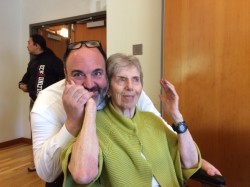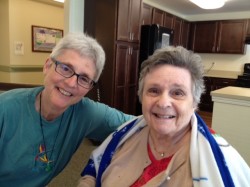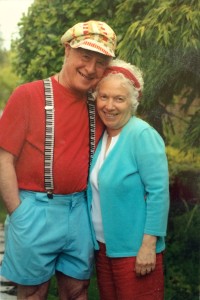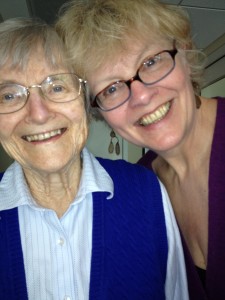15 Dec Family Caregivers Share Challenges and Coping Skills
Are you a family caregiver? I am. In fact, With A Little Help’s average staff age is 51 so several of our professional caregivers and office staff members also have family caregiving experience. Understanding both situations strengthens empathy for the natural differences in perspective of client and client’s family. I originally conceived of this blog, featuring the challenges and coping mechanisms of four family caregivers, because I was curious about the issues other people encounter in family caregiving and I hoped to gain understanding that would help all readers caring for a loved one. What I found was that these narratives helped me as much in my professional caregiving career as they have in the care of my own mother. I hope you enjoy these four honest and inspiring stories.
 Andrew Cohen, of Coho Accounting, provides care for his mother. His biggest challenge was preparing emotionally for her journey into dementia. A bright, resourceful and independent spirit, his mother learned she had Parkinson’s 12 1/2 years ago but kept it in abeyance for 9 years during which Andrew was able to prepare himself for Parkinson’s inevitable physical progressions. Not all Parkinson’s patients develop dementia but when Andrew’s mother started experiencing symptoms it put added stress on their ability to negotiate her care and, at times, strained their communication. Where does he turn for support? “I try to remember the good times,” Andrew told me. He also receives important guidance from a dear friend who is a hospice nurse and talks to friends about their own family caregiving situations…his “ad hoc support group.” Most remarkably, he founded his business, Coho Accounting, as a result of his experience with his mother’s need for fiduciary support. He works now with client families going through situations similar to his own. What has he learned? Three main things: Really listen. Don’t disagree with your mother (or with anyone experiencing dementia). Be willing to have difficult and honest conversations.
Andrew Cohen, of Coho Accounting, provides care for his mother. His biggest challenge was preparing emotionally for her journey into dementia. A bright, resourceful and independent spirit, his mother learned she had Parkinson’s 12 1/2 years ago but kept it in abeyance for 9 years during which Andrew was able to prepare himself for Parkinson’s inevitable physical progressions. Not all Parkinson’s patients develop dementia but when Andrew’s mother started experiencing symptoms it put added stress on their ability to negotiate her care and, at times, strained their communication. Where does he turn for support? “I try to remember the good times,” Andrew told me. He also receives important guidance from a dear friend who is a hospice nurse and talks to friends about their own family caregiving situations…his “ad hoc support group.” Most remarkably, he founded his business, Coho Accounting, as a result of his experience with his mother’s need for fiduciary support. He works now with client families going through situations similar to his own. What has he learned? Three main things: Really listen. Don’t disagree with your mother (or with anyone experiencing dementia). Be willing to have difficult and honest conversations.
 In addition to being a long distance caregiver for her mother who is living with dementia Sally F is a support to her partner who is at the beginning stages of a chronic disease. Sally’s biggest challenge with her mother’s caregiving has been navigating the different ways she and her sibling see things and contending with the viewpoints of long time caregivers who became pseudo family members expressing their own point of view. If this were Facebook I’d simply write: it’s complicated. Dementia, Sally says, is a long journey that can forge personal growth. “It is hard, sad, depressing and full of grief. With caregiving and dementia grief is ongoing. It doesn’t end. The marathon. I had to hit the rock bottom of grief to be able to move on to appreciating the gifts of caregiving. I am learning to forgive myself and know that I am Loving and not Perfect. I may be hurt or scared or shamed, but I am still OKAY! I repeat that everyday. Easy to say, ‘take care of yourself, forgive yourself,’ and hard to do. That is the gift of caregiving, we learn how to live life. Love others more and ourselves.” Sally’s helping tools? The informative process of creating estate and end of life documents such as advance directives/wills/power of attorney, exercise, gratitude lists, the Powerful Tools for Caregivers class, talking to friends, finding comfort in “now.” Sally also turns to the resources of caregiver advocates at Senior Services who are resourceful and “remind me that I am okay and doing a wonderful job… One thing at a time. Keep breathing.”
In addition to being a long distance caregiver for her mother who is living with dementia Sally F is a support to her partner who is at the beginning stages of a chronic disease. Sally’s biggest challenge with her mother’s caregiving has been navigating the different ways she and her sibling see things and contending with the viewpoints of long time caregivers who became pseudo family members expressing their own point of view. If this were Facebook I’d simply write: it’s complicated. Dementia, Sally says, is a long journey that can forge personal growth. “It is hard, sad, depressing and full of grief. With caregiving and dementia grief is ongoing. It doesn’t end. The marathon. I had to hit the rock bottom of grief to be able to move on to appreciating the gifts of caregiving. I am learning to forgive myself and know that I am Loving and not Perfect. I may be hurt or scared or shamed, but I am still OKAY! I repeat that everyday. Easy to say, ‘take care of yourself, forgive yourself,’ and hard to do. That is the gift of caregiving, we learn how to live life. Love others more and ourselves.” Sally’s helping tools? The informative process of creating estate and end of life documents such as advance directives/wills/power of attorney, exercise, gratitude lists, the Powerful Tools for Caregivers class, talking to friends, finding comfort in “now.” Sally also turns to the resources of caregiver advocates at Senior Services who are resourceful and “remind me that I am okay and doing a wonderful job… One thing at a time. Keep breathing.”
Phyllis Shacter gave care to her husband, Alan, while he had laryngeal cancer and Alzheimer’s. He died peacefully in April 2013 after he chose to voluntarily stop eating and drinking (VSED). Although she was desperate for help, one of Phyllis’ biggest challenges was the intrusive nature of bringing caregivers in the house. At that vulnerable time, it represented a loss of privacy, a breach of intimacy, and a challenge to boundaries. “It was a blessing and an emotional drain,” she explained. She didn’t really have the energy to train caregivers. Some caregivers failed to see that Phyllis was Alan’s main caregiver telling her what to do/how to behave in her own house. Caregivers defined their jobs differently, for instance, some cooked for both of them and some felt their job only included a need to cook for Alan. “Everyone had their own story,” Phyllis told me. It was disturbing to “have to consider their needs” when she and Alan’s needs were so immediate. What would she recommend for families bringing in caregivers? Set boundaries. Find caregivers that suit your individual needs. Realize that most caregivers are trained to support life. If applicable, make sure your caregivers are comfortable taking care of someone who is going to die legally on their terms. After Alan’s death Phyllis’ biggest challenge was grief. She said, “I knew that the only way I would survive the grief was to go through it. She had no family in the area and “needed a care buddy…someone who would check on me and help me determine my needs. I needed to be invited to dinner a couple times a week for the first six months.” Now Phyllis uses her accumulated life skills to advocate for others considering VSED and promotes expanding our choices about how and when we die. Check out Phyllis’ website, www.phyllisshacter.com, and TEDx talk “Not Here by Choice.”
gave care to her husband, Alan, while he had laryngeal cancer and Alzheimer’s. He died peacefully in April 2013 after he chose to voluntarily stop eating and drinking (VSED). Although she was desperate for help, one of Phyllis’ biggest challenges was the intrusive nature of bringing caregivers in the house. At that vulnerable time, it represented a loss of privacy, a breach of intimacy, and a challenge to boundaries. “It was a blessing and an emotional drain,” she explained. She didn’t really have the energy to train caregivers. Some caregivers failed to see that Phyllis was Alan’s main caregiver telling her what to do/how to behave in her own house. Caregivers defined their jobs differently, for instance, some cooked for both of them and some felt their job only included a need to cook for Alan. “Everyone had their own story,” Phyllis told me. It was disturbing to “have to consider their needs” when she and Alan’s needs were so immediate. What would she recommend for families bringing in caregivers? Set boundaries. Find caregivers that suit your individual needs. Realize that most caregivers are trained to support life. If applicable, make sure your caregivers are comfortable taking care of someone who is going to die legally on their terms. After Alan’s death Phyllis’ biggest challenge was grief. She said, “I knew that the only way I would survive the grief was to go through it. She had no family in the area and “needed a care buddy…someone who would check on me and help me determine my needs. I needed to be invited to dinner a couple times a week for the first six months.” Now Phyllis uses her accumulated life skills to advocate for others considering VSED and promotes expanding our choices about how and when we die. Check out Phyllis’ website, www.phyllisshacter.com, and TEDx talk “Not Here by Choice.”
 Marilyn Raichle was a caregiver to her mother, Jean, who died of Alzheimer’s Disease in April 2015. Her biggest challenge was the impulse to want her mother back. “I had accepted the fact that she (mother) had Alzheimer’s but I don’t think I fully understood it. I still wanted her “back”. I learned not to go there…” she explained. “I was having a difficult day at work and I called mom who would normally tell me that everything will be okay. But as we talked she became more and more agitated. As I listened I could feel her backing away and that’s when I broke through; letting go of the wonderful woman she was and embracing the wonderful woman who was with me NOW.” Where did Marilyn turn for support? Her mother’s assisted living community. “Assisted living is an appetite for me now. I have 6 new mothers there. I go three times a week and give them all neck rubs. There’s a sense of community there.” She also threw herself into a project inspired by the profound art her mother created at Seattle’s Elderwise Day Program. That project, The Art of Alzheimer’s, promotes the surprising and beautiful artwork created by people living with dementia. The project’s first public exhibit, The Artist Within, opens at Seattle City Hall’s Lobby Gallery and Anne Focke Gallery January 7, 2016 and runs through February 26, 2016. “Dementia is not about fear it’s about hope,” Marilyn said, “That’s my new mission in life. To teach people about hope.”
Marilyn Raichle was a caregiver to her mother, Jean, who died of Alzheimer’s Disease in April 2015. Her biggest challenge was the impulse to want her mother back. “I had accepted the fact that she (mother) had Alzheimer’s but I don’t think I fully understood it. I still wanted her “back”. I learned not to go there…” she explained. “I was having a difficult day at work and I called mom who would normally tell me that everything will be okay. But as we talked she became more and more agitated. As I listened I could feel her backing away and that’s when I broke through; letting go of the wonderful woman she was and embracing the wonderful woman who was with me NOW.” Where did Marilyn turn for support? Her mother’s assisted living community. “Assisted living is an appetite for me now. I have 6 new mothers there. I go three times a week and give them all neck rubs. There’s a sense of community there.” She also threw herself into a project inspired by the profound art her mother created at Seattle’s Elderwise Day Program. That project, The Art of Alzheimer’s, promotes the surprising and beautiful artwork created by people living with dementia. The project’s first public exhibit, The Artist Within, opens at Seattle City Hall’s Lobby Gallery and Anne Focke Gallery January 7, 2016 and runs through February 26, 2016. “Dementia is not about fear it’s about hope,” Marilyn said, “That’s my new mission in life. To teach people about hope.”

